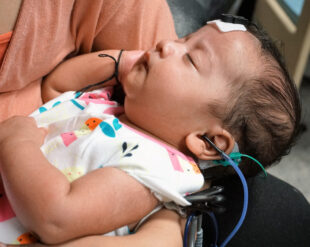The NHS Newborn Hearing Screening Programme (NHSP) screens babies during the first few weeks of their lives to find those who are born with hearing loss. These babies and their families can then be offered the right support, treatment and information as early as possible.
We refer babies to paediatric audiology for diagnostic hearing tests if clear responses are not recorded from either or both ears during the screen. We aim to refer only those babies who have a permanent hearing loss. However (as no screen is perfect) a number of babies who have normal hearing are also referred, which can lead to unnecessary anxiety for parents. We always aim to keep the number of babies in this group as small as possible.
The newborn hearing screening test measures a baby’s response to sound using 2 methods:
- Automated otoacoustic emissions (AOAEs)
- Automated auditory brainstem responses (AABRs)
Last Friday’s PHE Screening blog article looked at how NHSP aims to share learning to improve the performance of NH2, the newborn hearing screening key performance indicator (KPI) that helps ensure early assessment of babies referred for audiological assessment.
We have published a report that describes what we learnt from the best performing newborn hearing screening programme (NHSP) sites in England.
Making Lancashire service more efficient
At the Lancashire Teaching Hospitals Trust, we have made a big effort to improve the efficiency of our service and reduce parental anxiety.
Five years ago our referral rate from screening to audiology was 4%, which is higher than the national standard (≤3.0%). This meant that nearly 180 babies needed more hearing tests to find out whether they had any permanent loss of hearing.
Even though our screeners carefully explained to parents the importance of having these tests, many did not attend their audiology appointment. A survey showed this was because some parents did not understand their baby might have a hearing problem or, if they did, thought it was only temporary. Our high referral rate and high rate of non-attendance caused wasted audiology appointments and delays in the diagnosis of those babies who did have a permanent hearing loss.
The audiology service struggled to meet its key performance indicator (KPI) threshold of seeing 90% of referred babies within 4 weeks of referral from hearing screen completion; only achieving 76%. Also, because of time pressures, it could not offer all the diagnostic tests and instead offers a rescreen as “triage” to all before proceeding to diagnostics. Any delay in getting results is worrying for parents if there is a chance their baby could have hearing loss.

Newborn baby being screened for hearing loss
So what did we do?
We made full use of the 3-stage screening process by:
- screening babies in the first few hours of birth using AOAE (AOAE1)
- re-screening babies a few hours later using AOAE (AOAE2), rather than moving straight to the AABR screen if no clear responses were recorded from AOAE1
We reviewed our outpatient service and:
- increased the number of clinics
- improved flexibility by offering appointments 7 days a week
- enabled screeners access to the audiology booking system so they can book and discuss with parents appointments that best suited them
- asked parents to provide a contact telephone number and sign to confirm their appointment
- arranged for audiology staff to contact parents to identify any reasons why it may be difficult for them to attend their baby’s appointment, agreeing a more convenient time if necessary
- texted or telephoned parents to remind them of their appointment
- involved the health visitor if required
- carried out weekly checks to find babies who are close to the 4-week audiology appointment KPI target
What difference did these changes make?
- Our referral rate has come down from 4% to 1.1%; meaning just 46 babies were referred from screening in the last 12 months.
- We now routinely exceed the national 90% KPI of seeing babies for audiological assessment within 4 weeks of referral, often achieving 100%!
- We now have more time to carry out full diagnostic assessments, enabling us to identify babies who have a permanent hearing loss and to discharge those babies that don’t sooner.
- We can adjust our audiology staffing levels to match demand.
- Importantly, we have reduced the anxiety experienced by parents.
- Following the national screening process filtered out more babies with a temporary hearing loss, allowing us to strengthen our message to parents about the importance of attending their baby’s audiology appointment in a way we were not able to do before.
PHE Screening blogs
PHE Screening BLOGs provide up to date news from all NHS screening programmes. You can register to receive updates direct to your inbox, so there’s no need to keep checking for new blogs.